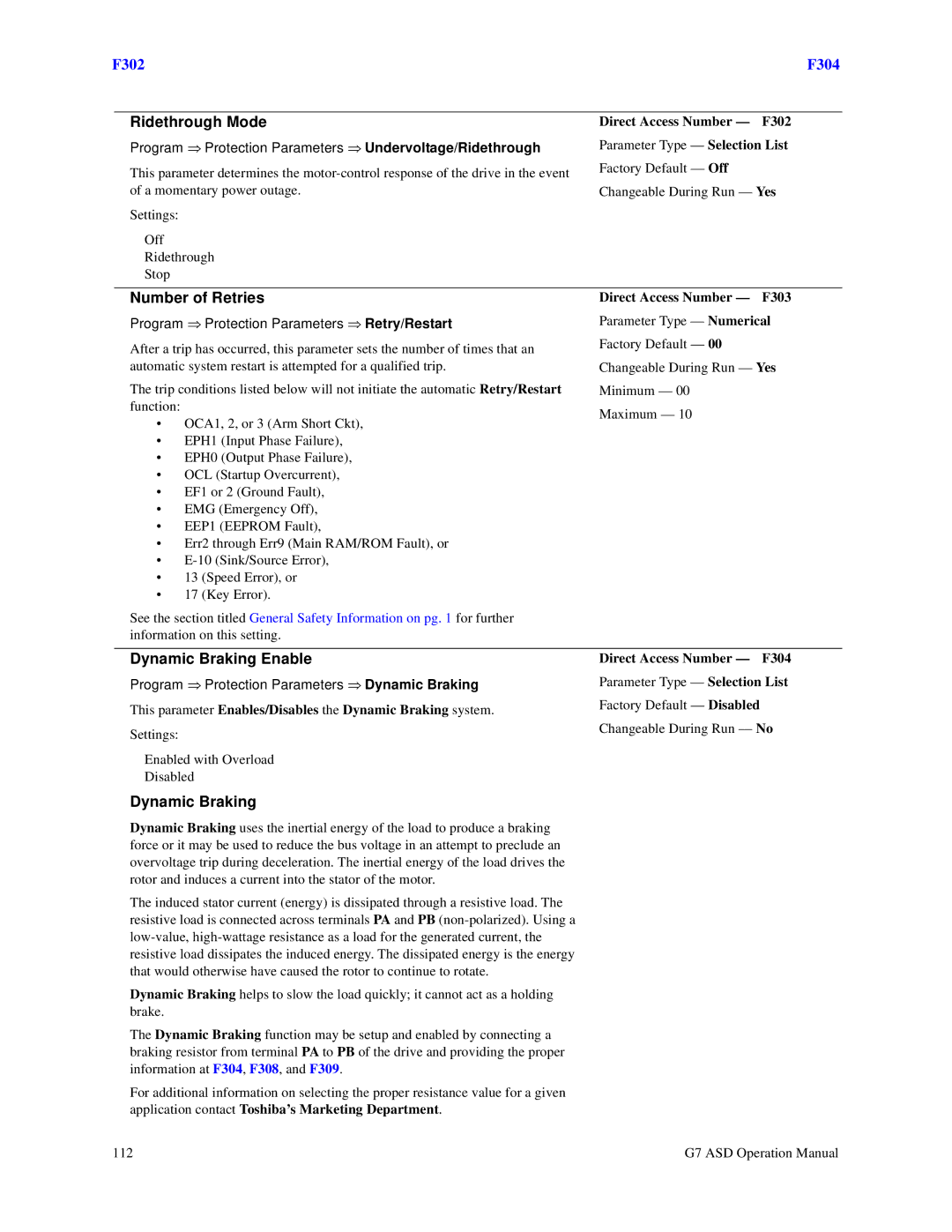F302 |
|
| F304 | |
|
|
|
| |
| Ridethrough Mode | Direct Access Number — | F302 | |
| Program ⇒ Protection Parameters ⇒ Undervoltage/Ridethrough | Parameter Type — Selection List | ||
| This parameter determines the | Factory Default — Off |
| |
|
|
| ||
| of a momentary power outage. | Changeable During Run — Yes | ||
| Settings: |
|
|
|
| Off |
|
|
|
| Ridethrough |
|
| |
| Stop |
|
|
|
|
|
|
| |
| Number of Retries | Direct Access Number — | F303 | |
| Program ⇒ Protection Parameters ⇒ Retry/Restart | Parameter Type — Numerical | ||
| After a trip has occurred, this parameter sets the number of times that an | Factory Default — 00 |
| |
|
|
| ||
| automatic system restart is attempted for a qualified trip. | Changeable During Run — Yes | ||
| The trip conditions listed below will not initiate the automatic Retry/Restart | Minimum — 00 |
| |
| function: |
| Maximum — 10 |
|
| • OCA1, 2, or 3 (Arm Short Ckt), |
| ||
|
|
| ||
| • EPH1 (Input Phase Failure), |
|
| |
| • EPH0 (Output Phase Failure), |
|
| |
| • | OCL (Startup Overcurrent), |
|
|
| • EF1 or 2 (Ground Fault), |
|
| |
| • | EMG (Emergency Off), |
|
|
| • | EEP1 (EEPROM Fault), |
|
|
| • Err2 through Err9 (Main RAM/ROM Fault), or |
|
| |
| • |
|
| |
| • 13 (Speed Error), or |
|
| |
| • | 17 (Key Error). |
|
|
| See the section titled General Safety Information on pg. 1 for further |
|
| |
| information on this setting. |
|
| |
|
|
|
| |
| Dynamic Braking Enable | Direct Access Number — | F304 | |
| Program ⇒ Protection Parameters ⇒ Dynamic Braking | Parameter Type — Selection List | ||
| This parameter Enables/Disables the Dynamic Braking system. | Factory Default — Disabled |
| |
|
|
| ||
Settings: | Changeable During Run — No |
|
Enabled with Overload
Disabled
Dynamic Braking
Dynamic Braking uses the inertial energy of the load to produce a braking force or it may be used to reduce the bus voltage in an attempt to preclude an overvoltage trip during deceleration. The inertial energy of the load drives the rotor and induces a current into the stator of the motor.
The induced stator current (energy) is dissipated through a resistive load. The resistive load is connected across terminals PA and PB
Dynamic Braking helps to slow the load quickly; it cannot act as a holding brake.
The Dynamic Braking function may be setup and enabled by connecting a braking resistor from terminal PA to PB of the drive and providing the proper information at F304, F308, and F309.
For additional information on selecting the proper resistance value for a given application contact Toshiba’s Marketing Department.
112 | G7 ASD Operation Manual |
